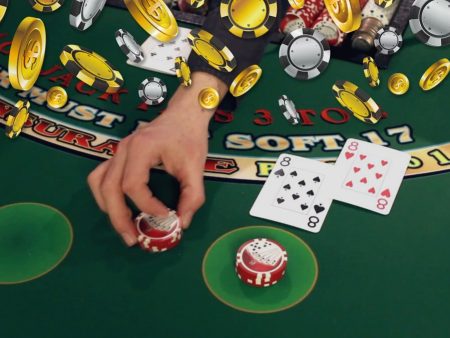In the past, I wrote articles advising against taking out insurance when playing blackjack. Over 90% of players who have read my articles have followed this advice.
However, in this article, I will present the opposing side to give you a more comprehensive understanding of insurance. There are certain situations in which insurance can be the best play, but these situations are only obvious to professional card counters. Since card counting pros spend their time beating casinos instead of reading my articles, I still advise everyone to avoid taking out insurance.
So why am I writing this article about insurance? You’re about to learn that there are certain situations while playing blackjack where it makes sense to take out insurance. These situations may surprise you, but they are not the reason most players have insurance.
Now let’s discuss the argument against insurance. Simple math can explain why insurance is often a bad choice, but it can also be used to prove that insurance can work in certain situations.
When the dealer has an Ace, they offer insurance to all the players at the table. Insurance costs half of your initial wager and pays 2:1 if the dealer has a natural blackjack. A natural blackjack is only possible if the dealer’s down card is worth at least 10 points.
The odds are against the face-down card being worth 10 points, with a 30.77% chance that the dealer has a blackjack. This is because out of the 13 card ranks, only four are worth 10 points and nine are not. The face cards and the 10s are the four value ranks worth 10 points each.
The casino has an edge when you compare the payout of 9 to 4 to the payout of 2 to 1. To be fair, the odds of the dealer winning a blackjack must be equal to the payout. A payout of 2 to 1 means that 33.33% of dealers must have a blackjack.
The insurance wager is a good option in situations where the dealer is likely to have a blackjack. However, most of the time, the dealer has a chance of getting a blackjack with a 33.33% or lower probability. This is because the percentage or odds of the dealer winning a blackjack are calculated based on the normal composition of a deck.
But what happens when you consider the knowledge of the cards that were played and the remaining cards in the deck or shoe? Can you use this information to decide if taking out insurance is a good idea?
Let’s take a look at an example of a bet that changes from bad to better once you have figured out the math behind insurance bets. Imagine you’re playing in a single deck blackjack game.
In the first round, you see 14 cards. One card is worth 10 points, and the remaining cards are valued at 10. The deck contains 38 cards, with 14 cards already played. The dealer holds an ace facing up, and you have a king in hand. You now have 17 cards in your hand, including the dealer’s ace. There are 35 remaining unseen cards, with 14 of them having a value of 10 points. The odds of the dealer holding a 10-point down card are 21/14 or 3/2 against. This means that there is a 40% chance of the dealer having a natural blackjack.
In this example, the winning insurance bet pays 2 to 1, which means there must be a minimum 33.3% chance of a dealer blackjack. In this case, it is 40%.
This example shows that insurance can be a profitable wager, but it is also an extreme example. This information can be used in any single-deck blackjack game and even in double-deck games if you are good at tracking cards.
It’s important to recognize and take advantage of every advantage available, but it is rare to have insurance with an edge. It’s worth looking out for if you frequently play single- and double-deck games.
However, profitable insurance is only possible if you do other things to reduce the house edge. First, find blackjack games with good rules. Then, master basic strategy. Only after you have learned the rules and mastered perfect strategy should you start looking for insurance opportunities. Even then, I recommend looking for insurance options to learn more about counting cards.
When you begin to track card ratios, you’ll be using the same card-counting techniques as card counters. The insurance wager is already built into a good counting system, so you’ll know when to take it.
Understanding how insurance works and when to take it is crucial if you want to maximize your advantage at the blackjack table. If you don’t want to do the extra work, stick to good rules and a proper strategy. Declining insurance every time won’t cost you much in the long run.
Making insurance decisions you don’t want to make can be a costly error.
In conclusion, insurance at the blackjack table can be a poor idea for players who use basic strategy or don’t count cards. After mastering basic blackjack strategy, you can start looking for insurance opportunities as a sign that you are ready to explore card counting. Understanding and applying the information above is a small step towards becoming a successful card counter.
How does the house edge affect the profitability of insurance bets in blackjack?
When playing blackjack, one of the most important decisions a player makes is whether or not to take insurance. Many players are reluctant to take insurance due to its associated losses. However, taking insurance isn’t always a bad bet.
First, we should understand what insurance actually is. Insurance is the term for the bet placed when the dealer’s face-up card is an Ace. The bet amount can not exceed half the amount of the original bet. If the dealer’s face-down card is a 10-value card, the player is paid 2 to 1 on their insurance bet. If not, the insurance bet is lost.
Taking insurance is a bad bet when the house edge is considered. This is because the house always has a 5 to 6% edge on insurance bets. This is due to the fact that when the player makes this bet, they are only being paid 2 to 1 on their wager and the probability of the dealer having a blackjack is only 30%.
However, taking insurance can be profitable if the player is able to count cards. There are plenty of counting systems out there that can help you keep track of which cards have been played and give you an indication of a possible blackjack. If a player has a good count, they can decrease the house edge on insurance bets to 0. Also, if a player has a great count, they can even put the edge in their favour.
In conclusion, taking insurance in blackjack isn’t always a bad bet. It has a 5 to 6% house edge, and a player should only take insurance if they have a good understanding of the cards that remain in the deck. If a player can count cards accurately, they can turn the odds in their favour and increase their chances of winning on insurance bets.









